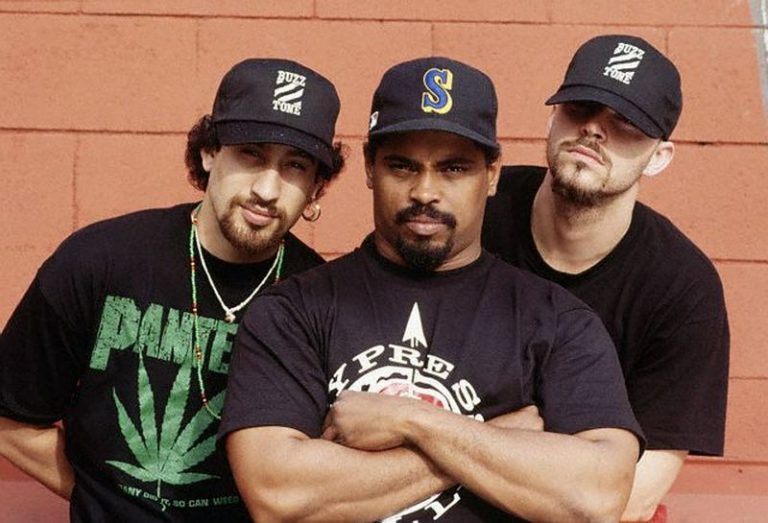Cypress Hill are West Coast Hip Hop icons that have been creating platinum selling albums for over 3 decades now. Lyrically, their songs reflect their personal life experiences; their sound has no limits to what it can do as it can easily go from hip hop to rock to even dubstep. Live, they’re versatile as they can perform for any crowd whether its alternative, rock, or hip-hop. Fusion was fortunate to catch up with Cypress Hill’s MC, Sen Dog, to talk about the early days of Cypress Hill as well as his favorite Cypress Hill songs and album.
When you guys came on the scene, did you realize that your music was going to be so influential and pioneer the West Coast movement?
Naw, man we didn’t. At that time we didn’t know we were pioneering anything. Our whole mentality at that point was just survival and how are we gonna stand out in the midst of N.W.A, Compton’s Most Wanted, Low Profile and Ice-T and all the great acts that were out here at that time; and how are we gonna stand out? We were trying to be different on purpose because so many things had been done already—at that point we had no way of telling what our legacy would be.
How did you start Cypress Hill?
The whole movement started like in the mid 80s, around 83, 84. That’s when I first started to want to rap. I got a hold of my brother and we started our first little rap crew together with DJ Julio G, who’s been a pioneer in his own right, and then along the way we met DJ Muggs through Julio, and then B Real came in. He and my brother were in the same break dancing crew and he wanted to write. So by the time we started Cypress Hill it was like 1988, after my brother had gone solo and Julio was on the radio, and it was just basically. . . B Real and I were left on the block and Muggs was doing that group called 783, but at the same time he was sending me cassettes in the mail from New York and Philadelphia, and when I got these cassettes, me and B Real would listen, and start rehearsing and get down the stuff. So, that’s how it started right there.
Once Muggs had returned from the east coast from his work with 783, he was signed to Geffen and he heard our rhyme schemes that we had for the songs. He was like, ok we’re gonna go full on this now and record this everyday. That was in 88, 89. We worked really hard getting more songs down. Then in 1990 by the graces of the gods we were appreciated by a label enough to give us a recording contract and some money to do it. That was Ruffhouse Records out of Philadelphia.
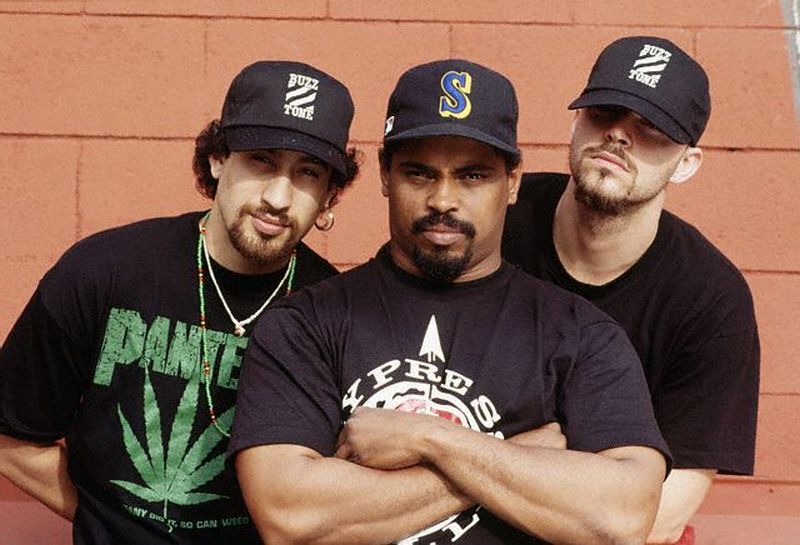
When you guys were in the studio recording that first album, what was the chemistry like between you guys?
The chemistry with us had always been from our days of running on the streets, playing football against other neighborhoods and being just a brotherhood, being like a neighborhood. It wasn’t really like a gang thing, all Cypress Avenue, you know, but like a sense of strong brotherhood. I would say about 35, 40 dudes that were all from Cypress Avenue back in those days. That chemistry just carried over cuz we all just genuinely cared for one another and we always had that sense of this is my homeboy, you know, whatever it takes for homeboy type shit, and that was the chemistry we took into the studio.
I really enjoy the song “Pigs” from your first album. Police brutality is once again at the forefront of American Culture. It’s now being documented by regular citizens via their cell phones. What’s your opinion on our current state of affairs in terms of police abuse and brutality, specifically to minority groups?
Right now, I think that issue is more out of control than it’s been, like in the last 40 years. There have been quite a few incidents with police departments and the regular public. People are getting killed and dying and it just keeps happening over and over and over. It just seems like it can’t stop. I do believe that there are people on both sides of the issue that are at fault for things like that happening, but the misuse of power is the misuse of power.
There’s no explanation for getting pissed off to the point that you kill somebody. Its part of your job to handle people that are gonna be irrational, and they’re trained for just such a situation. I think when these things happen and the government takes these long looks at it and doing the proper investigations and avoiding riots and shit like that, then that’s the result of the right thing not being done. If its gonna happen and the right people are gonna be held accountable for it, I think that’s the right way to handle it, but overall its like, how long can a mass of people continue to feel mistreated and be done wrong, and nothing be done to the person at fault for it, and expect there not be some kind of public response from the masses?
It’s ridiculous to think that the abuse of power can go on to such a high level and someone could lose their life and cities could burn. There are steps that could be done to avoid that kind of stuff, but it has to be done each and every time. In the streets if you kill somebody, then you’re gonna get dealt with, you’re gonna get caught, put in prison or get shot yourself. My main point is that if its gonna happen and people end up in prison and people end up dead, then expect some kind of negativity in a violent form to appear.
What music were you being inspired by at that time and what were you listening to?
I’ve always been inspired by the bands that were around when I was a little kid, like Parliament-Funkadelic, Santana, Black Sabbath, KISS, Zeppelin and Rick James and shit like that. I was always influenced by that and it’s always been part of my life. But at that point that we were getting really deep into hip-hop. I remember EPMD being one of my go-to groups when I wanted to get my serious hip-hop groove on—there’s nothing harder than EPMD. Those guys are just like murderers bro, you know? Then we had LL Cool J, we had Beastie Boys, Ice T was creating lots and lots of attention with his movement. And these are the people we were looking up to—Run DMC and the list could go on and on and on. There was just so much music that was coming out. And right around that time the beginnings of NWA were starting to resonate on the street.
You guys came out with your second album, Black Sunday. You guys came out with songs like “I Wanna Get High,” “Cock the Hammer,” and “Insane in the Brain.” Did you immediately know you had a hit song with “Insane in the Brain?”
No, we didn’t know that man. I still remember getting a phone call from our manager that, hey we want to put out a tester song, just to let people start knowing Cypress Hill’s getting ready to come back, and I think Muggs or B was like, put that “Insane in the Brain” song out. That’ll be a cool little ‘hey check this out’ type song, and I was like yeah, that Insane’s song’s cool. Put it out for that purpose. I thought we had a bigger hit with “Ain’t Going Out Like That” on that album. We all agreed that we’d put this song out as like a little treat, like here you go, here’s Cypress.
I was on vacation right after that and I get a call, and I was in Hawaii or some shit, and they told me that 117,000 stations had picked that song up and had it on rotation, and I was like, that song, really? Yeah, that song’s major. So we kinda changed plans. They were like, we’re gonna fly you into San Francisco. We’re gonna do a video for “Insane in the Brain.” I was like, Ok, sure whatever. So we showed up and did the video, and damn, the video took off too. I was like, fuck, this song’s on its own trip. It’s got its own set of wings. From that point on, it was like, hold on, cuz we’re going for a ride. This song was gonna go wherever the fuck it wanted to. I had no idea once we made that song that it was gonna have that kind of success around the planet.
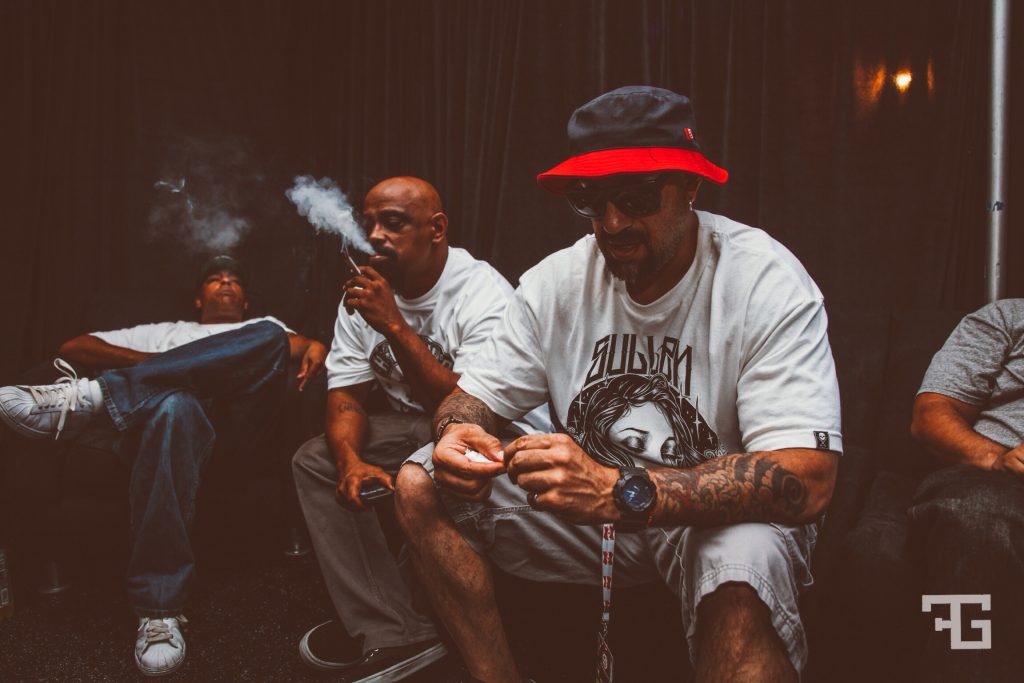
I also enjoy the song “I Wanna get High.” You guys are huge advocates of marijuana. Can you tell me a little bit about that.
I’ve been smokin weed since I was like 12, you know, that’s when I first started. I don’t recommend that to any kid. I’m not trying to say its cool, but that’s just how old I was when I started. It’s always been a big major part of my life, even when I couldn’t even tell people that I smoked marijuana. But I’ve always known the importance of it from growing up and learning shit. I had this buddy I got high with and his parents were hippies and they’d let us smoke weed in their house. They would always tell me about the politics of weed, and why its illegal and who made it illegal, and who’s benefitting from it being illegal, and it kinda subliminally stuck in the back of my mind.
Growing up, the only really outlet that we had that agreed with that mentality was High Times magazine. One of the big deals every month was getting the new High Times and going through it and seeing new growing techniques, and NORML, and what’s NORML doing to get involved in legalizing, how far away we are from legalizing. It was like our bible.
The way that we lived, you know, and what we thought and it really got into B Real’s psyche, and once he started getting high with us, it became an everyday thing for him too. It kinda like opened his eyes. One of those phone calls you know, you get from your buddies one day could turn into something like you know, me calling you up and being like, “dude what’s up man, I wanna get high man, what’s up?” Just little instances like that could stick in somebody’s head and next thing you know you gotta song out of it. I think somewhere along the way, B just started paying attention to every single thing that had to do with marijuana. He was just paying attention to it, and listening to it and grabbing whatever he could grab on to.
Because of that, I think you have these great marijuana anthems that he wrote, like “I Wanna Get High.” What stoner has never said that, right? At one point or another, you’ve said it, you know what I mean. Like “dude I wanna get high” you know? I think that’s just how clever an MC he had started, you know, he had become and how close he was in touch with the everyday stoner. That’s a special one for, not just him writing one of the greatest songs ever, but for Cypress Hill to have on our catalog. That would be one of the songs that represents our catalog. So we were like definitely going on the right. . . we were still the same people, we were just more intelligent, more educated, and we could put more information on the records.
I really believe that anthems like “I Wanna Get High” and various other ones that you guys put out really helped our culture be where it is today—in terms of the marijuana movement and social acceptance.
Well, thank you. You know, that’s not something we go around bragging about or anything like that. Like, hey we did this, we did that. I think the best moments of that’s when someone tells you, “hey man if it wasn’t for you guys, you guys had a big part to do with that.” I think that’s a really cool thing. And you know, somewhere along the way, someone had to pick up the torch that Cheech and Chong had lit, and made it more socially acceptable, how? Was the question. You couldn’t just make, like another pair of dudes, and be like, the new Cheech and Chong. It had to be something different. It had to be something that the people that they gave birth to as far as likewise thinkers, and that was Cypress Hill. We were somewhere chillin watching those Cheech and Chong movies in a serious fuckin way. We weren’t just watching them, smoking weed and being like, “ha ha, that’s funny.” We were like, “no, this is the shit!” There was something more to it than what the average viewer probably was thinking. And that’s called giving birth to something, and Cheech and Chong definitely had something to do with giving birth to it, you know, the guys in Cypress Hill. But, you know, it goes like that, and you have to be there recognizing you have a good idea, to continue on, and get people’s attention n shit.
I know since Black Sunday you guys came out with Temples of Boom, Skull and Bones, Rise Up, a lot of good albums. Out of all the albums that you guys put out, which one really stands out above the rest?
To me, that’ll always be the 1st album, cause this is an album that we made with hardly any money, and when the 1st record first came out it didn’t really sell a lot of records. For the first like, 8 months, we were out there touring real heavy. Trying to get where we could get to and then one day, things turned around for us, but at that point we were just some starving ass young dudes that were still pretty much fresh. We were from South Gate, California. We knew that we had a good album, but so what if you have a good album? That doesn’t always translate into success. I think the route that we had to take to turn that record from just a good record from these guys to ‘oh fuckin shit, Cypress Hill!” I’m very proud of that 1st record. Just to get signed and get it out there was a mission and it’ll always be my go-to Cypress Hill record. If I have to have just 1 of them, it would be that one.
And what song is your favorite from that album?
“How I Could Just Kill A Man” nigga! “Hand on the Pump,” “Latin Lingo”—those songs were part of our reality, what we went through everyday, what our friends went through. LA was a very violent city at that point—gang bang-wise. People were getting dropped everyday and people were getting killed just for protecting their families. Songs like “How I Could Just Kill a Man,” was born from, you know, that violence. . . trying to explain how it is that we live in a society like that. Everyone thinking that we’re all like that. But nah man, if I’m put in that position I might just turn into that. But when people heard “How I Could Just Kill a Man” they were like “these niggas are out to kill muthafuckers.. Fuck this shit!” But there was more to the song than that.
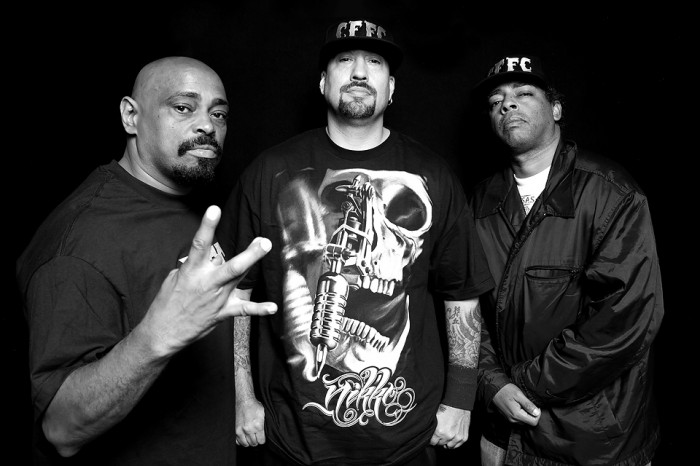
What are you guys working on today?
We stay busy. We’re finishing up a new Cypress Hill record with DJ Muggs, and then every member of the band has their own side project thing that we stay doing, and just stay working on something or another. Cypress Hill is good and everything, but there’s just more music that you have in your head that you might want to do but you might not feel like it’s a Cypress thing, so you do it on your own and get it out there and there’s no problem with anybody within the band with everyone else having side projects. Its something we encourage. So we’re all out here trying to stay creative.
I listen to hip hop today and it just doesn’t have that same feel or that same excitement that it did when you guys were producing your first 2, 3, 4 albums. What’s your take on the current state of hip-hop?
I see the current state of hip-hop. . .you know, there was an era in rock and roll music that everybody called glam rock,and I feel like that’s where hip-hop is right now. We’re like in glam rap. It’s great, its beautiful. It generates a lot of money, sells a lot of records. We’re on all the award shows, we’re raking up the awards, and we’re on the radio and all that stuff, but I think it’s very, very commercialized and it’s very pretty at times, and I think that’s where it’s at right now.
When we started, our era, was a state of consciousness, of uplifting the hip-hop community as one and becoming the new big time entertainers or whatever, and then it went into an era of self, of look at me, my house, my money, my cars, and everybody wanted to throw money in the fucking air, and all that shit. Then it turned into glam rap, and that’s just how I see it right now. It’s a very acceptable form of entertainment, by a lot of different people and a lot of different cultures have reached their highest success with it. I think it’s become that right now. That’s what’s dominating it anyways. There’s a lot of other stuff that’s having success that isn’t that, but for the most part its gone very fashionist? Like I said, glam rap. It’s out there, dig? That’s where it’s at right now.
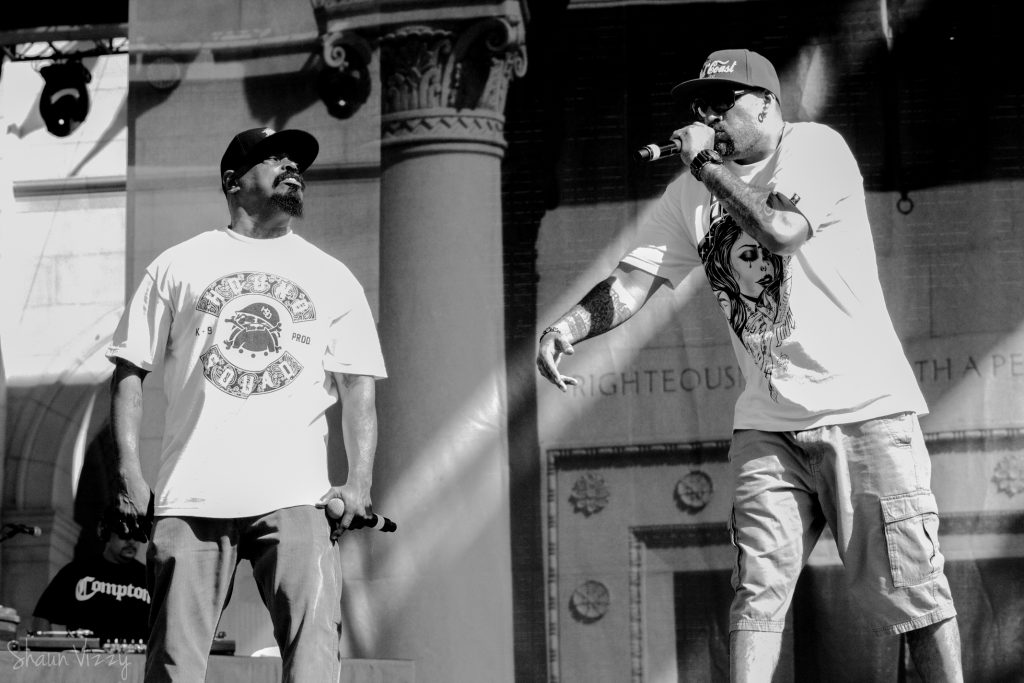
Photos: Courtesy of Cypress Hill


